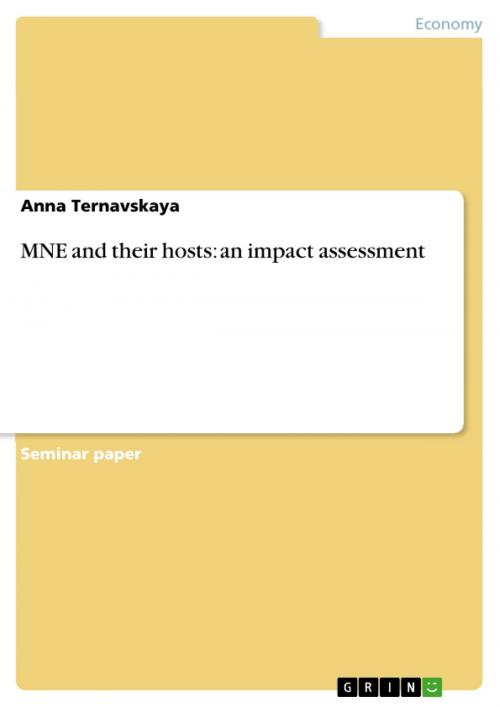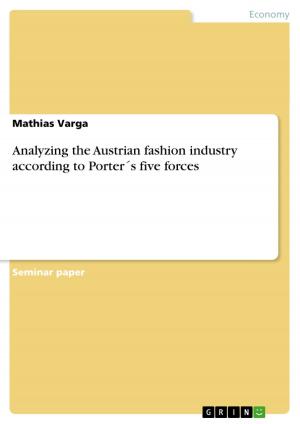| Author: | Anna Ternavskaya | ISBN: | 9783638057929 |
| Publisher: | GRIN Publishing | Publication: | June 4, 2008 |
| Imprint: | GRIN Publishing | Language: | English |
| Author: | Anna Ternavskaya |
| ISBN: | 9783638057929 |
| Publisher: | GRIN Publishing |
| Publication: | June 4, 2008 |
| Imprint: | GRIN Publishing |
| Language: | English |
Seminar paper from the year 2007 in the subject Economics - Foreign Trade Theory, Trade Policy, grade: 1,0 (A), Leeds Metropolitan University, course: Multinational Enterprises, 31 entries in the bibliography, language: English, abstract: This report examines the effect of foreign direct investment (FDI) on the economy of Russian Federation. Stretching across Europe and Asia, Russia is a vast country which possess spectacular wealth in the form of exploitable natural resources, technology, a large, skilled workforce, and nearly 150 million consumers whose needs are endless. The importance of international capital flows has been steadily increasing over the past decades, with FDI becoming an important source of external finance. Attraction of FDI is forming a quite crucial aspect of government policy, based on implicit assumption that greater inflows of FDI will bring certain benefits to the country's economy. However, the issue of FDI impact is controversial both in theoretical and empirical terms. This paper makes an attempt to find some answers. The report is organized as follows. The next section provides an overview of the main characteristics of the inward FDI flows and stocks in Russia. The second part traces the most visible economic benefits and risks Russia has derived from foreign direct investment. The final section examines the main policy implications based on the findings of the previous chapters. This working paper has been prepared by Ms Anna Ternavskaya, Research Assistant at Leeds Metropolitan University under the direction of Mr Gerry Stewart. It is a condensed version of a study prepared for a Conference on Foreign Direct Investment: Opportunities and Challenges. The report is based on statistical data and material available up to the first quarter of 2007 and obtained primarily from statistics of the Central Bank of the Russian Federation (CBR) and the State Committee of the Russian Federation for Statistics (Goskomstat) as well as from international data compiled by UNCTAD and IMF. The transition process to the market-oriented system is the key issue in the Eastern European countries. A successful transition depends not only on the usage of domestic resources, but also on the inflow of foreign capital into the country. Foreign direct investment (FDI) is broadly defined as ownership of assets in one country by residents of another for purposes of controlling the use of those assets.
Seminar paper from the year 2007 in the subject Economics - Foreign Trade Theory, Trade Policy, grade: 1,0 (A), Leeds Metropolitan University, course: Multinational Enterprises, 31 entries in the bibliography, language: English, abstract: This report examines the effect of foreign direct investment (FDI) on the economy of Russian Federation. Stretching across Europe and Asia, Russia is a vast country which possess spectacular wealth in the form of exploitable natural resources, technology, a large, skilled workforce, and nearly 150 million consumers whose needs are endless. The importance of international capital flows has been steadily increasing over the past decades, with FDI becoming an important source of external finance. Attraction of FDI is forming a quite crucial aspect of government policy, based on implicit assumption that greater inflows of FDI will bring certain benefits to the country's economy. However, the issue of FDI impact is controversial both in theoretical and empirical terms. This paper makes an attempt to find some answers. The report is organized as follows. The next section provides an overview of the main characteristics of the inward FDI flows and stocks in Russia. The second part traces the most visible economic benefits and risks Russia has derived from foreign direct investment. The final section examines the main policy implications based on the findings of the previous chapters. This working paper has been prepared by Ms Anna Ternavskaya, Research Assistant at Leeds Metropolitan University under the direction of Mr Gerry Stewart. It is a condensed version of a study prepared for a Conference on Foreign Direct Investment: Opportunities and Challenges. The report is based on statistical data and material available up to the first quarter of 2007 and obtained primarily from statistics of the Central Bank of the Russian Federation (CBR) and the State Committee of the Russian Federation for Statistics (Goskomstat) as well as from international data compiled by UNCTAD and IMF. The transition process to the market-oriented system is the key issue in the Eastern European countries. A successful transition depends not only on the usage of domestic resources, but also on the inflow of foreign capital into the country. Foreign direct investment (FDI) is broadly defined as ownership of assets in one country by residents of another for purposes of controlling the use of those assets.















